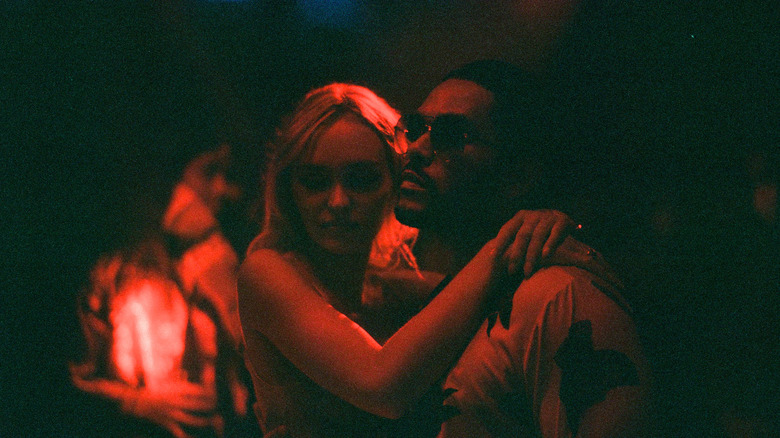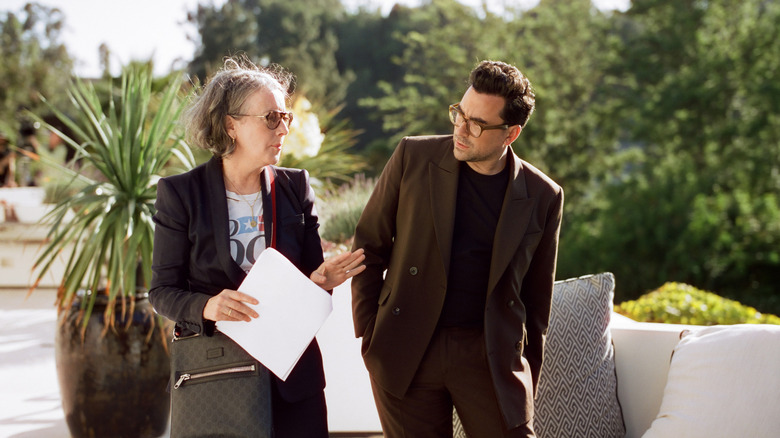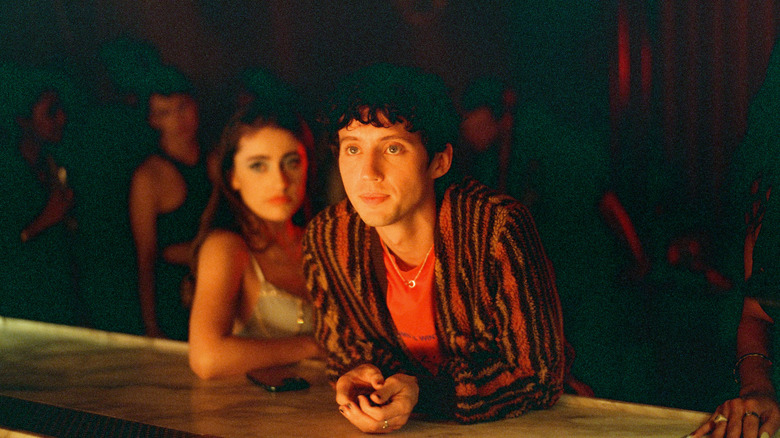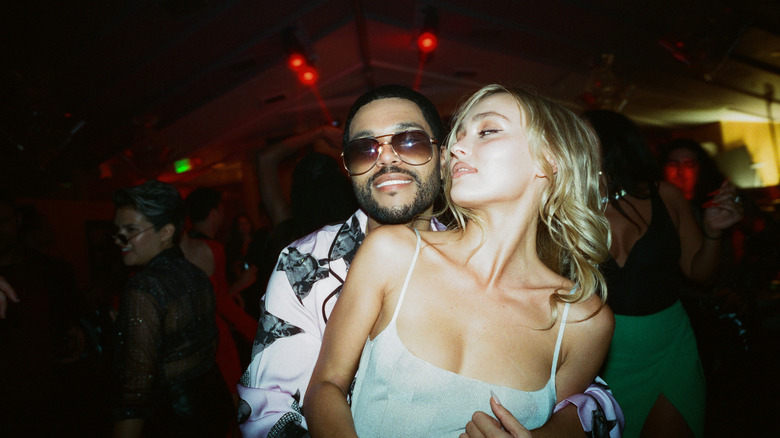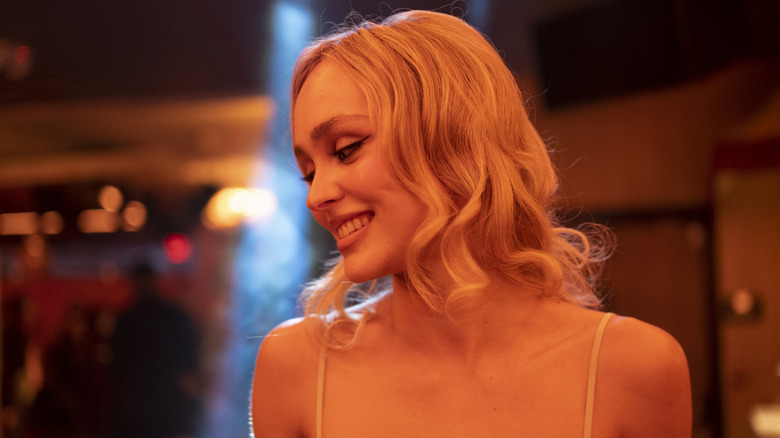The Idol Review: The Series Might Be Insecure And Miscast, But Sam Levinson Is Still Making Vital Television
Sam Levinson's work is not easy to write about. The writer and director has in the course of just a few, prolific years done what takes many other artists much longer. He's gone from small productions to big ones, massively increased his budget cap, with this most recent project, "The Idol," he's been invited to the Cannes Film Festival, and he's become a household name, a harder feat for behind the camera personnel than those whom the camera trains on.
The fact that Levinson has become a known quantity outside of film-sophisticate circles has to do with the provocative nature of most of the stories he tells, sure, and the attendant scandals they often produce, and the buzzy young actors implicated in those scandals too. But more than these reasons, I think Levinson's ability to break the below-the-line barrier comes down to the fact that his work now evinces a highly recognizable style.
Ask a handful of critics who the most important filmmakers of the 21st century are. A fair number are going to name Quentin Tarantino and Wes Anderson, but a fair number aren't. Ask the average, non-film-obsessed person the same question and these two will absolutely come up, and for the same reason behind Levinson's rise. There is a distinct glint to the casting, lighting design, music cues and overall sound design, execution of narrative climax and denouement, and especially to the editing in all his work from "Assassination Nation" (2018) onward.
Levinson is in pure form in "The Idol." It is easy in a critical culture fixated on versatility as the defining quality of artistic excellence to write the series off as more empty Levinsonian provocation, no better or worse than "Euphoria." But that's not what I'm going to do, even if it's true.
Doll Parts
"The Idol" centers on Jocelyn, a shining young pop starlet played by Lily-Rose Depp. We actually don't hear much of the music that made Jocelyn famous before "The Idol" catches up with her, nor do we get much of a sense of the image she and her team have presented to the world. But Depp's extreme beauty, the fragility conveyed by her slenderness and china doll face, her ruddy fitness and sturdiness demonstrated in the show's many demanding choreography scenes that counterbalances the fragility, Depp's aloofness, and her core of achingly simple sincerity most closely resemble Britney Spears, specifically in her "I'm a Slave 4 U" era.
Britney, of course, being the 21st century's ultimate pop star as public victim, should clue you in on where Levinson's interests lie here. Depp's primary co-star, Abel Tesfaye (aka The Weeknd) has spoken about bringing the idea of a series about the music industry to Levinson. But "The Idol" is really a show about celebrity. In specific terms, "The Idol" is about the experience of managed personhood that the fame industry requires, in which vulnerable, yet highly magnetic young women are systematically deprived of their autonomy, their integrity, and even their ability to speak. Each of those faculties are replaced by cynical handlers that make decisions on the artist's behalf, and often in their worst interest.
The extraordinary opening sequence of the first episode lays this dynamic out in diagnostic detail.
Mutually-assured manipulation
In "The Idol" opening scene, Jocelyn poses for professional photos in a skimpy robe on her bed. Depp rapidly cycles through convincing emotional states in close-up: sadness, desire, playful anger. The camera pulls back to reveal that behind the scenes, Jocelyn's entire team is engaged in a fight over which poses she can assume, which she can't assume, and whether she can even move without their explicit permission.
Managers, agents, PR spinners, intimacy coordinators, journalists, and industry executives played by the likes of Jane Adams, Hank Azaria, Eli Roth, Da'Vine Joy Randolph, Dan Levy, Rachel Sennott, Hari Nef, and Troye Sivan have come to a deadlock over whether or not Jocelyn has the ability to go topless in her own bedroom. Jocelyn herself expressing that she'd actually like to doesn't move the needle an inch. "The Idol" shows that the demands of public personhood require the person in question to be bifurcated: there is Jocelyn the star, a billboard-sized goddess built to cultivate desire, envy, and resentment to the highest degree in her audience, and then there is Jocelyn the person, whose limited human body becomes the site of extraction to pay all of Jocelyn the star's tolls.
As so often happens in stories like these, Jocelyn meets a man who seems different from the goons in her phony entourage. That's Tesfaye's Tedros, a sort of DJ/nightclub hype beast who encounters Jocelyn on a night out. Predictably, Jocelyn's profound desperation to be truly seen and heard blinds her to Tedros' barely hidden ulterior motives, which point to a Phil Spector/Ike Turner-esque desire to use her even more ruthlessly. But Jocelyn's almost inhuman control over her affect, clear from the very first scene, suggests she may not be the only one entering blindly into a deal with the devil.
A world of illusion
I said that "The Idol" is no better or worse than "Euphoria." That was a lie. It's definitely worse than "Euphoria," at least so far, but only because the world Levinson has turned his attention to is filled with so many people hiding behind dense masks. The world of celebrity is a world of illusion, where manipulation and deception are like blinking and breathing, where every mirror is a trick mirror, and where the personalities one encounters are so highly processed, such complex mixtures of authenticity and insincerity that one is often indistinguishable from the other. Simply put, it's hard to depict this world well. It's very easy to slide off the edge of representation into cliche, morally superior judgment, and pathetic fawning. And "The Idol" often does.
But when I implied that "The Idol" is merely one more "empty Levinsonian provocation," that was also a lie. I understand what attracted Levinson to the world of celebrity, besides the fact that he now moves through it and has likely gleaned some unique insights about it. Being a celebrity has a lot in common with being a teenager, as does the fame industry with high school. But teenagers are simply incapable of the kind of high-level schadenfreude and slick maneuvering that are common among the rich and powerful. As a consequence, "Euphoria" processed a channel of extraordinarily raw emotions and experiences, which, filtered through Levinson's liquidy, sinewy, glittering, and broken formal kaleidoscope, created something awe-inspiring. And something very honest.
"The Idol" is honest too, but it's honest about very fake people that we've already been told many times are fake. Levinson and his DP's ingenious camera placements, his editors' vertiginous cutting and splicing, and his seductive use of music still hit, but the impact is greatly diminished.
Euphoria this is not, but that's okay
"Euphoria" was composed with some false notes, but the overriding music was so potent and original that it ultimately nullified them. Anchored by Zendaya's Herculean performance as a death-driven young addict with a golden heart, the show was greatly aided by its supporting cast of relative nobodies. Talented nobodies, but the fact of their inability to be mentally placed elsewhere allowed viewers to feel immersed in "Euphoria" in the way one does in classic melodramas — everything is heightened to a pitch that practically forces you to submit to seduction.
Depp and Tesfaye are doing wonderful jobs so far. Depp gracefully swerves around easy cliches, guided by calmness, comfort with herself, and charming shyness that rarely shows up in tragic starlet types like hers. Tesfaye is her perfect foil, duping critics who lambast his macho, malevolent performance as unconvincing — it's supposed to be!
But Levinson has relented to the trend of cameo casting, where even throwaway characters have highly recognizable faces. He also greatly overloaded the cast with character actors and performers with very limited ranges. Jane Adams and Hank Azaria are great, their rough-edged inability to meld with an ensemble could have added something really interesting if they weren't surrounded by Dan Levy, Eli Roth, and Da'Vine Joy Randolph, who, surrendering to broad types, completely throw off immersion into the world of the show.
As for what actually happens, did we need to be led with thematic cues like a "Darling Nikki" needle-drop or Jocelyn watching "Basic Instinct"? Levinson hasn't completely circled back to his "Assassination Nation"-level of non-confidence in himself or his audience. But again, "Euphoria" this is not. It is, I strongly think, worth watching, and for all its weaknesses, "The Idol" is still more original, interesting, and pleasurable than most series ordered out of the TV boom of the past half-decade.
